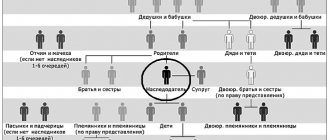In addition to the rights and property objects, the debts of the deceased are also transferred to the successors as part of the inheritance. These could be the following debts:
- non-payment of loan installments;
- utility debts;
- failure to deposit funds to pay taxes and fees;
- non-repayment of loans received from third parties against receipt;
- unpaid funds to the employer in the event of damage - if there was financial liability of the subordinate.
Not only the amount of the principal debt is inherited, but also fines, interest or penalties on the debt.
However, they cannot continue to accrue after the death of the testator, but must be repaid in the amount that was formed on the date of the person’s death.
Special types of debt
The inheritance of certain types of debts has a significant difference from the general procedure for transferring debt to successors.
Credit
If there is an obligation to repay the loan, you need to take into account its targeted nature. If the testator took out a mortgage loan on the property, then the property is transferred to the heirs along with the unpaid loan amount.
The successor may refuse the inheritance or accept the property along with such encumbrance.
In some cases, you will have to resolve additional issues with the banking institution that can sell the property with a mortgage. Inheriting a vehicle taken on credit also involves transferring the unpaid portion of the debt to the successors of the deceased.
Alimony
Some debts of a person are inextricably linked with his personality and cannot be passed on to other persons, including by inheritance.
For example, the responsibility to pay alimony for the deceased or to compensate for damage to the health of persons caused by the testator does not pass to the successors.
However, there is a nuance here: the amount of alimony not paid on time, which is recognized as a debt by a court decision, is subject to inheritance. Such debts, as well as the amount of accumulated fines and penalties, are recognized as ordinary obligations not related to the personality of the deceased.
Nature and limits of responsibility of heirs
According to Art. 323 of the Civil Code of the Russian Federation, all heirs who have entered into the right of ownership of the movable and immovable property of the testator have equal obligations to pay his debts . In this case, the maximum amount paid by each of the heirs cannot exceed the estimated value of the share of the property transferred to them.
- The assessment is made at the time of opening of the inheritance , and cannot be changed subsequently, even if the market value of the property changes.
- Clause 1 of Art. 418 of the Civil Code of the Russian Federation states that debts that were associated with the personality of the deceased (for example, fines) do not pass to the heirs.
- In addition, in the event of a refusal by one of the heirs by will or by law and the transfer of his rights to property to another person, a waiver of debts also occurs . In this case, the new heir is obliged to make payments only on the debts of the testator, regardless of the presence of debts with the person who renounced the rights to the inheritance.
Scope of responsibility of heirs for the debts of the testator
Inheritance of debts occurs in accordance with the rules governing the transfer of property by inheritance. Debt obligations are tied precisely to the property in relation to which they arose.
If this part of the inheritance passes to several heirs in equal shares, the debts are also divided equally. When an object of inheritance with an encumbrance passes to one heir, and other parts of the property to other applicants, then the debts are assigned to the first.
In order to resolve issues with the scope of responsibility of the heirs, the law prescribes the payment of debts to the applicant who takes actual ownership of the inherited property. The new owner pays off old debts.
Limitation period for claims of creditors against heirs
In accordance with the current Civil Code of the Russian Federation, the limitation period for claims of creditors against the successor is established - it is 6 months from the moment he accepted the inheritance. The exceptions to this rule are the following requirements:
- on the need to recognize ownership of property by third parties;
- on reimbursement of expenses incurred while caring for a deceased person during his illness or funeral;
- on reimbursement of expenses for the protection of property passed on by inheritance.
These claims are subject to a different statute of limitations – 3 years.
It is important to take into account several features related to the procedure for submitting demands for the fulfillment of obligations:
- claims can only be made against successors who accepted the inheritance, and it is important to comply with the statute of limitations;
- limitation period is a period that cannot be stopped or interrupted;
- Art. 1284 of the Civil Code of the Russian Federation prohibits foreclosure of copyright within the boundaries of its validity period.
Also on the topic: Entry into inheritance after 6 months according to the law of the Russian Federation
If the heir and the creditor are the same person, then he does not lose his right. Referring to the Civil Code of the Russian Federation, the heir is not released from liability for debts, and the creditor does not lose the right to fulfill the obligation.
Articles of the Civil Code of the Russian Federation establish a certain order of satisfaction of creditors' claims:
- Initially, costs incurred due to the need to care for a deceased person during illness or when organizing a funeral are subject to reimbursement;
- then the funds spent on the protection of the inherited property and its management are paid;
- costs of executing the will of the testator;
- other claims made by creditors in accordance with the established procedure in compliance with the limitation periods;
- fulfillment of the refusals provided for by the will.
For a certain period of time, the inheritance may be “lying”. In this case, it is allowed to use fiction - to file claims against the property, which does not turn it into a subject of legal relations.
Are debts on loans of a deceased person inherited?
Recipients of the property of the deceased are jointly and severally liable for most of the credit obligations of the deceased citizen. The debts of the testator are divided into:
- Inherited. These include loans, rent debts, fines, penalties for late loans, debts to third parties and other obligations that are not tied to the identity of the borrower and can be repaid without him.
- Not inherited. These include debts associated with the person of the deceased. These are payments for alimony, fines to the traffic police.
Important! The debts of the testator are transferred to the heirs in an amount not exceeding the size of the share of the property received by him. The value of a property is assessed at the time of the owner's death.
Which ones are inherited?
Heirs are legal successors of obligations that are not related to the personality of the testator. These include:
- Credit obligations. Car loans, mortgages, consumer loans, fines and penalties for violation of the contract.
- Payments. Utility payments, obligations for taxes, fees, penalties for late taxes.
- Child support debt. Funds that a citizen has not paid during his life pass to his legal successors.
Unsecured loan
Unsecured loans make up the majority of loans issued by banking organizations. These are relatively small sums of money that the borrower takes without guarantors and without pledging personal property - real estate or vehicles. When issuing such loans, banks, in order to protect themselves as much as possible from non-payment, put forward the condition of parallel registration of life insurance.
If there is insurance, after the death of the borrower, all responsibilities for repaying the loan pass to the insurance company.
The heirs in this situation do not bear any responsibility to the creditor for the debts of the deceased.
To avoid financial claims from the bank, they should contact the insurance company, providing a document confirming the death of the insured person, and a bank statement indicating the amount of the unpaid debt.
But if a person, when receiving a loan, refused to enter into an insurance agreement, then the loan by inheritance after the death of such a debtor is completely transferred to his heirs.
Car loan, mortgage
A home mortgage and the purchase of a car with a car loan belong to the group of secured loans, since the acquired property is de jure pledged to the creditor bank. If the collateral loan is insured, then financial responsibility falls again on the insurer.
In the absence of insurance, debts are inherited by the following persons:
- To co-borrowers and guarantors who acted as guarantors of debt repayment.
- To the heirs who received the collateral property in personal possession.
If the listed persons refuse to pay their debts, the credit institution has the right to go to court with a claim to foreclose on the collateral property - an apartment or a car. That is, turn them into your property through a court order.
You can avoid this by accepting the inheritance and re-issuing the loan in your name. After this, the bank obtains permission to independently sell the collateral with the condition of subsequent repayment of the remaining debt.
Alimony
Alimony refers to the personal debts of each person. This means that only he is responsible for them, and it is impossible to demand alimony payments from the heirs .
But the caveat is that this rule applies only to the future tense.
If the deceased had alimony debts already at the time of death, then the obligation to repay them completely passes to the heirs.
Public utilities
The heir is responsible for debts and utilities accumulated by the former owner of the apartment. When taking possession of the living space, the new owners will have to pay off the utility debt from their own funds.
Domestic legislation does not exempt even minor heirs from debt obligations. Along with the property of the deceased, they also receive his debts. They are accepted from heirs under 14 years of age by their official representatives (parents, guardians or adoptive parents). If the heir has reached the age of fourteen, then he himself has the right to accept debts.
Which ones are not inherited
The heirs do not answer:
- For obligations of a deceased relative that are directly related to his personality, for example, alimony.
- If the testator, through his actions, caused harm to the health or property of third parties.
- Fines for violations. If a deceased citizen committed an administrative offense for which he was given a fine, then the obligation to repay it does not pass to the heirs.
- Fines and penalties accrued after the death of the borrower. If the credit institution presents such amounts, the heir can challenge them in court.
Additional restrictions on the transfer of debt of a deceased citizen may be provided for by Family or Civil legislation.
What is the responsibility of the heirs for the debt obligations of the testator?
In accordance with Art. 418 of the Civil Code of the Russian Federation, the debts of the testator are understood as the totality of all obligations lying on him that have not been terminated by the time the inheritance is opened. At the same time, the time of their proper execution, as well as the presence or absence of information about them from the heirs, do not play a significant role.
Among these obligations one can highlight, for example, a loan agreement, which does not terminate upon the death of the person.
The liability of the successors takes place solely in accordance with the terms of the contract that was concluded between the deceased and his creditor. Therefore, early repayment of the debt by successors at their discretion is not allowed after the death of the testator, who is the debtor, unless the consent of the creditor is obtained (Article 810 of the Civil Code of the Russian Federation).
The provisions of this article are devoted to regulating the limits of liability of successors. It seems advisable to familiarize yourself with them in more detail. The responsibility of the heirs is joint, but it is assigned to each of them in proportion only to the share that he has in the inheritance received.
Plurality of persons in an obligation arises when there are several successors, since they are new debtors. Plurality does not arise if a different creditor appeared in each obligation of the deceased, since these are different obligations, they are not combined into one, and plurality is characteristic of one obligation.
If in one obligation of the deceased there were several creditors at the same time (for example, a married couple acted as creditors), then in this case a situation arises for his heirs when there is a plurality of persons on the side of the creditor and on the side of the debtor, because there are also several creditors (married couple) , and several debtors (successors).
The heirs are jointly liable for obligations, which implies the right of each creditor to demand the fulfillment in his favor of certain obligations in full or in part from each of the successors. Moreover, the degree of responsibility of each successor is strictly delineated by the boundaries of his share in the inheritance and cannot be increased under any circumstances.
In accordance with the law, the heir does not have the right to refuse to fulfill the obligation in full if he has a sufficient amount of inherited property to fulfill this purpose, declaring to the creditor about the injustice and the need for other successors to fulfill the obligation. The main circumstance is solely the correspondence of the value of the inherited property to the amount of responsibility assigned to the person.
When transferring inheritance rights to a person within the framework of a transmission regulated by Art. 1156 of the Civil Code of the Russian Federation, he is liable in proportion to the transferred share only for the obligations of the deceased, but at the same time he should not be liable for obligations in which the debtor is the previous successor who carried out the transmission. For example, the heirs to the father's property after his death are his sons. After the death of one of them, who did not have time to enter into the inheritance, the other will be able to receive both the initial inheritance from his father and the inheritance as part of the transmission from his brother, since he did not enter into rights.
How do heirs divide the testator's property?
Who inherits property if the heir dies before accepting the inheritance, read here.
Can grandchildren be heirs by right of representation? Read the link:
In addition, he will be the successor of the deceased brother by law and will have the right to receive his inheritance. He will bear responsibility for the obligations of the deceased parent only within the framework of the property that he receives after the death of his father and also after transmission due to the non-receipt of the inheritance by his brother. The obligations of the deceased brother will need to be fulfilled only in proportion to the inheritance received from the brother.
How to check for loan debts
Often relatives accept an inheritance without even knowing about the deceased’s loans, so calls from a bank or collection service later become an unpleasant surprise. In 2014, the Law of the Russian Federation No. 218 “On Credit Histories” dated December 30, 2004. changes have been made that protect successors from inheriting along with the assets of liabilities unknown to them.
So, according to paragraph 6 of Article 6 of Law No. 218, within the framework of notarial proceedings, notaries are vested with the right to check the composition of the inheritance mass. Those. When registering an inheritance, a notary can make a corresponding request to the National Bureau of Credit History (NBKI) and obtain information about all outstanding bank loans of the deceased. Credit history information is provided within 3 business days from receipt of the request.
What to do if debts are discovered after entering into an inheritance?
Lawyers at the Federal Chamber of Notaries explain that in this case, the creditor has the right to present his claims to the heirs - all at once or any of them. He can also divide the debt among the heirs and require each of them to pay their share. And if he does not receive money from someone, he has the right to redirect the debt to someone else.
It is worth remembering that each of the heirs is liable for the debts of the deceased only to the extent of the value of the property received by him. For example, the bank requires you to repay the remaining debt on your loved one’s loan - 500 thousand rubles. And your share of the inheritance is estimated at 300 thousand rubles. It is better to immediately inform the bank about this - and it will forward its demands to return 200 thousand rubles to other heirs (if there are any).
If the debt is greater than the total value of the inheritance, the creditor simply writes off the remaining debt.
In cases where the creditor fails to reach an agreement with the heirs amicably, he usually goes to court. Moreover, he files a claim immediately against all recipients of the inheritance who refused to pay the debt.
Each type of obligation has its own limitation period. In particular, the period for collecting debt on loans, borrowings and payments for housing and communal services is 3 years. For example, if the deceased has not paid rent for an apartment for five years, the management company of the house will be able to collect the debt from the heirs through the court only for the last three years.
It may happen that you received an inheritance in equal shares with other heirs, and the creditor made his claims only to you. In this case, your share of the inheritance exceeds the total amount of the debt, but you consider it unfair to pay alone.
If you do not want to sue a bank, microfinance organization or other organization, you can pay off the debt for other heirs and then demand that they reimburse you for their share. This can also be done through the court.
To what extent is the heir liable for debts?
Absolutely all heirs bear responsibility for the debts of the testator: by will, by law, by representation, etc.
When only one heir begins inheritance, there are no difficulties in determining his scope of inheritance. He is forced to inherit everything. But when there are several heirs, debts must be distributed accordingly among them.
In this case, the following rules for distributing the volume of inherited obligations apply:
- The inheritance must be accepted by the heir. He can do this by formally joining it or by actually receiving it. That is, if the heir does not want to receive debts by inheritance, he needs to renounce the entire inheritance. Partial refusal of inheritance is impossible.
- The heirs are jointly and severally liable.
- Payment of debts by inheritance is subject only to the extent of their share of the inheritance.
- The heirs are liable for debts only in an amount that does not exceed the value of the property received. They cannot answer for other people's debts with their own property. Simply put, if a person inherited 200 thousand rubles and 300 thousand rubles of debt, then he is obliged to pay only 200 thousand rubles.
The heir who has independently paid all the debts of the testator has the right, by way of recourse, to demand repayment of these amounts from the remaining heirs.
The nuances of inheriting debts to minors
Even a minor heir is required by law to inherit if he is entitled to a share. True, if debts are transferred along with the property, in accordance with Art. 28 of the Civil Code of the Russian Federation, the child’s parents are required to make payments.
The absence of parents does not exempt from inheritance, because in this case, the child’s guardians or trustees assume responsibility.
In addition, if desired, the child’s legal representatives have the right to completely refuse the inheritance received by the child. To do this, you will first have to obtain written permission from the guardianship and trusteeship authorities. After this, you can write a standard written refusal of inheritance.
In what order are debts collected from heirs?
The procedure for collecting debts of the testator is based on the rules of Art. 1175 of the Civil Code of the Russian Federation. This procedure was explained in sufficient detail by Resolution of the Supreme Court of the Russian Federation of May 29, 2012 No. 9:
- the debtor's heirs are not obliged to fulfill inherited debt obligations ahead of schedule (Articles 810, 819 of the Civil Code of the Russian Federation);
- the death of the debtor does not affect the limitation period for claims of creditors;
- liability for the debts of the testator is joint and several in nature (Article 323 of the Civil Code of the Russian Federation), it is borne by all heirs (both by law and by will), and in the case of escheated property: the Russian Federation, federal cities or municipalities in whose ownership it passed on;
- the heirs are liable for the debtor’s obligations within the limits of the value of the property transferred to them, for the rest of the creditors’ claims are not subject to satisfaction and are terminated (clause 1 of Article 416 of the Civil Code of the Russian Federation);
- the claims of creditors for the obligations of the heirs arising after acceptance of the inheritance (for example, for payment of inherited residential premises and utilities) are satisfied at the expense of the property of the heirs (clause 60 of the Resolution of the Armed Forces of the Russian Federation);
- the value of the property transferred to the heirs, the limits of which their liability for the debts of the testator is limited, is determined by its market value at the time the inheritance is opened, regardless of its subsequent change by the time the case is considered by the court (clause 61 of the Resolution of the Supreme Court of the Russian Federation);
- the heir who accepted the inheritance from the debtor becomes a debtor from the date of opening of the inheritance;
- the heirs of the guarantor are also liable within the limits of the value of the inherited property for those obligations of the guarantor that existed at the time the inheritance was opened (clause 62 of the Resolution of the Armed Forces of the Russian Federation).
How do dependents inherit?
How to avoid inherited debts
Art. 1112 of the Civil Code of the Russian Federation defines inheritance as a collection of property and debts of the deceased. Therefore, accepting property and refusing loans will not work. The heirs are liable for the debts of the testator within the limits of the property received.
The only way to avoid inheritance debt is to refuse to accept the property. Persons who formalized the refusal do not bear the burden of responsibility for the debts of the testator.
This can be done in the following ways:
- By application. The potential recipient submits a waiver application to the notary. However, such a right is retained exclusively for 6 months from the date of opening of the inheritance. The heir can issue a refusal within the specified period, even if he has previously submitted an application for acceptance of the property.
- Default. To do this, it is enough not to take actions aimed at accepting the inheritance (submitting an application to a notary, actual acceptance). However, this option is not possible if the citizen has previously informed the notary about the acceptance of the property.
Is it possible to refuse to take on other people's debts?
If you were not the one who opened the inheritance case, you can simply not go to the notary and not submit any applications. But in this case you also should not use the inherited property. Moreover, you cannot perform any actions with it. For example, pay housing and communal services debts for the apartment of a deceased relative, send for repairs or insure his car. Otherwise, it will be considered that you have agreed to inherit the property, and with it the debts, representatives of the Federal Notary Chamber emphasize.
If you have already submitted an application for inheritance, you may change your mind until you receive a certificate of your rights to the property of the deceased. You need to contact the notary who is handling the case and write a statement renouncing the inheritance. This decision can no longer be revised.
It will be possible to renounce property after you have entered into inheritance rights only through the court.
For minor heirs, their guardians can refuse the inheritance - but only with the consent of the guardianship authorities.
When creditors have the right to make claims
The right to repay the debts of the deceased accrues from the moment of his death. Until the acceptance of the inheritance, creditors have the right to make claims for repayment of debts against the property of the deceased. A written claim is drawn up and sent to the notary. It means that the heir’s liability for the debts of the testator begins from the moment of acceptance of the inheritance, in proportion to the inherited shares.
Features of the document:
- The claim must be submitted within 6 months from the date of opening of the inheritance.
- The document is submitted regardless of the maturity of debt obligations.
- The period for filing a claim for creditors does not exceed the general statute of limitations (no more than 3 years).
After receiving such a claim, the notary is obliged to notify the heirs of their existing debts. The notary must also explain the procedure for paying off the debt.
Deadlines for filing claims for debts
There is another misconception among heirs that they must repay the debt for the testator only after receiving a certificate of the right to inheritance.
Responsibilities regarding the dogs pass to the heirs at the time of opening of the inheritance, namely on the day of the death of the testator.
Therefore, there are often cases of additional penalties being assessed on heirs for late payments.
But the heirs do not always know that the testator had outstanding debts, so they can appeal the accrued penalties in court. Often the court is ready to accept the death of the main borrower as a valid reason for delay. In this case, the court makes a decision on the need to pay the debt in the amount in which it was at the time of the death of the testator.
Debt obligations of heirs have limited terms of fulfillment. Today they are no more than 3 years, as established by current legislation. The dates are also calculated from the date of death of the testator.
At the end of the three-year period, creditors no longer have the right to assert their claims against the heirs. The debts of the testator are written off as losses by creditors.
Judicial practice on inheritance of debts
The main plaintiffs in matters of inheritance of debts are credit organizations. Since their activities directly depend on timely repaid loans, they are the ones who are interested in the return of funds, including interest, penalties and other penalties.
In second place are alimony. However, since the claimant is the son or daughter of the deceased, in most cases they receive a mandatory share.
But also don’t forget about receipts, contracts and other sources of debt. So before you run off in search of great wealth, consider whether your testator had any pending transactions.
Special cases of inheritance of debts
The debts of the deceased pass to the heirs in cases where they are not recognized as inextricably linked with the personality of the deceased testator.
Each specific type of debt obligation has its own characteristics of inheritance and debt collection from heirs.
Debts on mortgages and car loans
Successors are liable only to the extent of the shares of the property they inherited. For such an assessment, it is necessary to take into account the market value of the inherited property. The price is determined on the date of opening of the inheritance case; it cannot change.
In addition to heirs by law and by will, such debts can be transferred to other entities, in particular:
- Guarantors;
- Co-borrowers;
- Insurance companies with a loan insurance agreement.
The heir, if he has entered into an inheritance, must independently notify the bank of the death of the testator as early as possible.
After this, he can act in two ways:
- Re-register the property in your name, use it and repay debts on a schedule approved by the credit institution;
- Sell the property and thus pay off part of the debt.
Child support debts
As a general rule, alimony payments are classified as a category of debts that are inextricably linked with the deceased debtor. However, alimony has its own inheritance characteristics.
The alimony debts of the deceased are canceled only for a future period of time.
However, if during his lifetime the testator accumulated a large amount of alimony debt to his children or spouse and did not have time to repay it before his death, such debts are recognized as ordinary obligations. Therefore, they must be repaid by the heirs.
Debts for utilities
Having inherited an apartment, house, room or other living space, the heir also receives a bunch of debts for utility bills, which formed during the time of non-payment by the testator. This obligation will have to be repaid.
You can find out in advance information about their availability from the management company that services the house.
Features of inheritance of utility debts
Debts for utility bills are often transferred along with inherited property.
The heir should take into account that if he accepts the inheritance, he must repay the resulting debt in full. It does not matter whether the heirs lived in the apartment at the time the utility debt was created.
The legislation does not contain conditions for reducing utility debt for an inherited apartment.
It is worth considering that the situation is similar with tax debt. So, in the general case, debts to the budget are canceled with the death of an individual, but if he has heirs, then they are obliged to pay such a debt.
Debts on unsecured loans
For ordinary debts, as a rule, there is no guarantee in the form of collateral or a surety agreement. In such situations, banks often oblige their clients to enter into life insurance contracts.
If the debtor dies, the insurance company has to pay the debts. If the debtor has not concluded such an agreement, this obligation passes to the heirs.
But in order to receive payment from the insurance company, you will have to prove that the death of the debtor is an insured event. Such a case may be considered:
- Committing an accident;
- The presence of an illness leading to death;
- Death as a result of an unsuccessful operation.
If the debtor was involved in extreme sports and died as a result, the insurance company will not legally pay off his debts. To successfully resolve a dispute with an insurance company, you need to constantly maintain close contact with its employees.
Unfortunately, an inheritance is not always a gift of fate in the form of a sudden receipt of wealth from a deceased relative. Often receiving an inheritance is associated with new difficulties and obligations.
Debts, just like property, are inherited by law and will, and must be paid by the heirs in full within the limits of their inherited share.
The heirs have the right to refuse to receive such an inheritance, but it cannot be partial. You can refuse an inheritance only in its entirety.
Therefore, in order to be prepared to receive a debt inheritance, it is better to make inquiries in advance about loans and other obligations of the deceased testator.
Can debts grow after the death of the debtor?
Financial institutions have the right to charge interest on loans and borrowings even after the death of the borrower.
At the same time, fines and penalties for late payments cannot increase. The creditor is required to record the amount of fines as of the date of death of the person. And it cannot charge new penalties until someone accepts the borrower’s inheritance along with his debts.
It is better to immediately contact a bank, microfinance organization or credit union as soon as you find out that your loved one remains their debtor. There you will need to present a death certificate and request that no fines be assessed until the inheritance and financial obligations officially pass to you.
If the creditor learned about the death of the debtor late and managed to calculate additional penalty interest, you have the right to demand that they be recalculated after you enter into the inheritance.
If the amount of debt is large, by the time you enter into an inheritance, large interest rates may accrue on the loan or loan. Discuss with your creditor whether it is possible to “freeze” the debt until you accept the inheritance.
It is especially important to negotiate if the amount of debt is large or the creditor has property as collateral that you should inherit. In addition, there are cases when there are several heirs and you do not yet know how the property will be distributed between you, and therefore, what part of the debt you will have to pay and what part will have to be paid by other legal successors.
If you are the only heir and know that you will be the one to pay the debts, find out from the creditor whether you can immediately begin making payments for the deceased. Ask for a payment schedule. If the amount is small, it may be more convenient for you to pay off the loan early to save on interest payments.
Financial institutions most often accommodate heirs halfway. They restructure the debt - they shift payments to a later date. Or they agree to accept money from a person who was not indicated in the agreement as a co-borrower or guarantor.
Typically, it is easier for banks, microfinance organizations and credit unions to negotiate peacefully with debtors and receive all payments under the agreement than to seek repayment of the debt through the court or re-register and sell the collateral.
You can ask creditors to recalculate the amount of debt even after you inherit. But this threatens to turn into unnecessary trouble. Perhaps by this time the creditor will have time to transfer the overdue debt to collectors - and it is not always possible to agree with them on the restructuring of the loan or loan.
Liability of guarantors for the obligations of the deceased
The liability of guarantors for the obligations of a person ceases with the death of the latter. There are two exceptions:
- the contract establishes the liability of the guarantor even after the death of the borrower;
- with the consent of the guarantor, to be responsible for the successors of the deceased person.
Also on the topic: The procedure for entering into an inheritance of the only heir
If the borrower has no heirs, then the inheritance mass is considered escheat - transfer to the state treasury. Consequently, the state fulfills the obligation to repay the loan. An exception is the consent of the guarantor to answer for the obligations.
As for the limits of liability, the guarantor is liable for obligations within the limits of the total loan amount. Often this provision becomes the cause of a conflict between a banking organization making claims within the limitation period and an individual acting as a guarantor.
Is it possible to refuse an inheritance with debts?
Unfortunately, in some cases, inheritance is more of a headache than it's worth. This happens in cases where the debt “eats up” all or most of the inherited property. Then you urgently need to look for an answer to the question of how to avoid inheritance debts.
In all situations, without exception, either the heir himself or his legal representative (if the heir is a minor) has the right to refuse inheritance. To do this you need:
- Within six months from the date of the start of the inheritance procedure, you must write a statement in any form about renunciation of the rights of the heir. It is possible to issue a refusal even if the heir learned about the debts after entering into the inheritance; the main thing is to have time to submit the application within six months;
- The document should be certified by the notary who took over this inheritance matter;
- Depending on the wishes of the applicant, the alienated inheritance rights can be transferred to a specific heir, or to the general inheritance property;
- Of course, indirect refusal of inheritance by ignoring the possibility of entering into it is also allowed. But this option is less reliable. To protect yourself from a legal point of view, it is better to issue a refusal.
That's all. If all the heirs formalize the refusal, the property along with the debts will be transferred to the municipality, which, in turn, will begin to regulate the dispute.
Can an heir declare himself bankrupt if he is unable to pay the debts of the deceased?
Maybe, but it makes more sense to declare the deceased bankrupt. In this case, in order to pay off creditors, only his property will be taken and sold, and the things of the heirs will not be touched.
Bankruptcy law describes in detail the conditions and procedures in the event of the death of the debtor.
If an apartment or house was inherited and this housing became the only one for the heir, it will be left. It is only important that this property is not pledged under a mortgage loan. Otherwise, they will sell it to pay off the debt to the bank.
Search for heirs
If there are no payments on the loan, the bank begins to check information about the death of the borrower and look for heirs. The necessary data can be obtained from a notary at the borrower’s place of residence. However, such cases are rare. More often, the heir himself goes to court in order to peacefully resolve issues regarding the debt.
If there is no information about the heirs, the bank goes to court with a claim for payment claims against the executor of the will.
Fines and penalties
Sometimes inheriting debts along with property comes as a complete surprise to the heirs. The financial institution, without notification of the borrower’s death, continues to charge penalties and fines for late payment of loan obligations, so by the time the heir contacts the bank, the amount of debt increases significantly.
When a loan is inherited, the heir becomes the borrower and is subject to an agreement obliging him to make payments according to the established schedule.
During the 6 months while the inheritance is being accepted, the bank can charge interest on the unpaid loan, but it can make demands for payment of the debt only after the heir receives a certificate of acceptance of the inheritance.
In this case, the heir can apply to the court by preparing a statement of claim with a request to cancel the additional penalties accrued by the bank immediately after the death of the borrower.
According to Art. 333 of the Civil Code of the Russian Federation, the penalty can be reduced if the court finds it disproportionate to the consequences of failure to pay the debt. An important argument for the court is that late payment is not a consequence of negligence, but the result of force majeure. The heir’s guilt for non-payment of the loan will begin from the moment the certificate of the right to inherit property comes into force.
How can heirs avoid paying fines and penalties accrued by the bank after the death of the borrower?
Banking organizations, having not received information about the death of the borrower in time, automatically charge fines for non-payment. Because of this, by the time the inheritance case is closed, the amount of the original debt increases significantly. This option, of course, does not suit potential heirs. But, from a legal point of view, banks act on the basis of a concluded loan agreement.
In such a situation, it is possible to avoid paying fines and penalties accrued by the bank only by applying to the courts.
According to legal practice, the court in most cases sides with the heirs when rendering a verdict on the annulment of fines. In this case, the court relies on Article No. 333 of the Civil Code of the Russian Federation, recognizing that the delay in the next payment is not the fault of the person who has not yet entered into inheritance rights by that time.
Illegal demands of collectors
Quite often, in order to minimize losses, banks sell loan debt to collectors. They often use semi-legal schemes to influence the heir and try to force him to pay off debts for the testator by all means.
If the heir did not enter into inheritance rights, was not a guarantor for the loan, or refused the inheritance, demands to repay the debt have no legal basis.
In such a situation, you need to threaten the collectors with contacting law enforcement agencies and ask them to provide demands in writing (usually they do not agree to this, since they understand that they are acting illegally).
If calls continue, then you need to try to record them and make sure that witnesses are present during the conversation. Then you can contact the prosecutor's office with a statement of extortion.
Thus, the debts and loans of the testator are included in the estate along with other property. The responsibilities of the heirs include payment of the debts of the testator: such as loans and borrowings, debt for housing and communal services and other shares that are not related to the personality of the deceased (alimony and compensation for harm). Debts are inherited to the extent of the value of the inherited property. The heirs have the right to refuse inheritance and, along with it, debts.
Arbitrage practice
Courts regularly satisfy the claims of banks regarding the collection of debts from the heirs of a deceased citizen.
Example. The bank filed a lawsuit to collect the debt under the loan agreement from the heir. The co-defendant was the borrower's guarantor. The requirements are justified by the existence of a loan agreement that was concluded between a relative of the heir and the bank. The bank claimed that the heir accepted the property in the form of an apartment and a cash deposit. However, after assuming property rights, the new debtor and his guarantor refuse to fulfill their obligations.
The creditor asked to recover from the defendants the amount of debt and the state duty paid. The guarantor admitted the claims. But, he asked to assign the obligation to collect the debt to the heir due to the lack of financial ability to repay it. The heir did not appear in court. Since he lives in another city. By phone I asked to refuse the claim. But the court satisfied the creditor’s demands and jointly collected the debt from the heir and the guarantor (Decision of the Verkhnebureinsky District Court of the Khabarovsk Territory dated 02/07/2011, case No. 2-48).
If the heirs abandoned the property of the deceased, the court will refuse to collect the debt from the credit institution.
Example. The bank went to court to collect funds from the heir to pay off the loan debt. The defendant did not appear in court. He did not indicate the reasons for his absence. Properly notified. The notary reported that the inheritance case had not been opened. Information from the State Traffic Inspectorate, Rosreestr, and the State Real Estate Cadastre did not contain data on the deceased’s property. The court refused to satisfy the bank's demands, since the persons who entered into the inheritance were not identified (Decision of the Baymak District Court of the Republic of Bashkortostan dated May 11, 2017, case No. 2-429).
Selling debt to collectors
Often, banks, in order to avoid unnecessary costs of litigation, sell credit debts to a collection agency. Such an organization uses relatively legal methods.
A person who does not accept the inheritance is not obliged to pay the debts of the deceased. However, agency employees are trying to force citizens to pay.
At the same time, they use the weak legal knowledge of the heirs, threaten and blackmail. In case of illegal actions, a citizen must act as follows:
- ask for a written demand for payment of the debt;
- record threats;
- file a complaint with the prosecutor's office.
The law establishes fines for collection agencies for illegal actions in the amount of 500,000 rubles.
Features of debt liability
- The heir who accepted the property as an inheritance is obliged to pay the debts of the testator.
- If there are several heirs, liability is shared jointly. Creditors have the right to bring claims against one or more debtors.
- Each heir bears financial liability for debts in proportion to the accepted share of the inheritance.
- If claims from creditors exceed the value of the accepted inheritance, the law does not provide for the liability of heirs with their own property. In this case, the obligations are terminated.
- Credit debt also passes to the heirs. At the same time, they must study in detail the loan agreement, which may describe various nuances, for example, material security.







